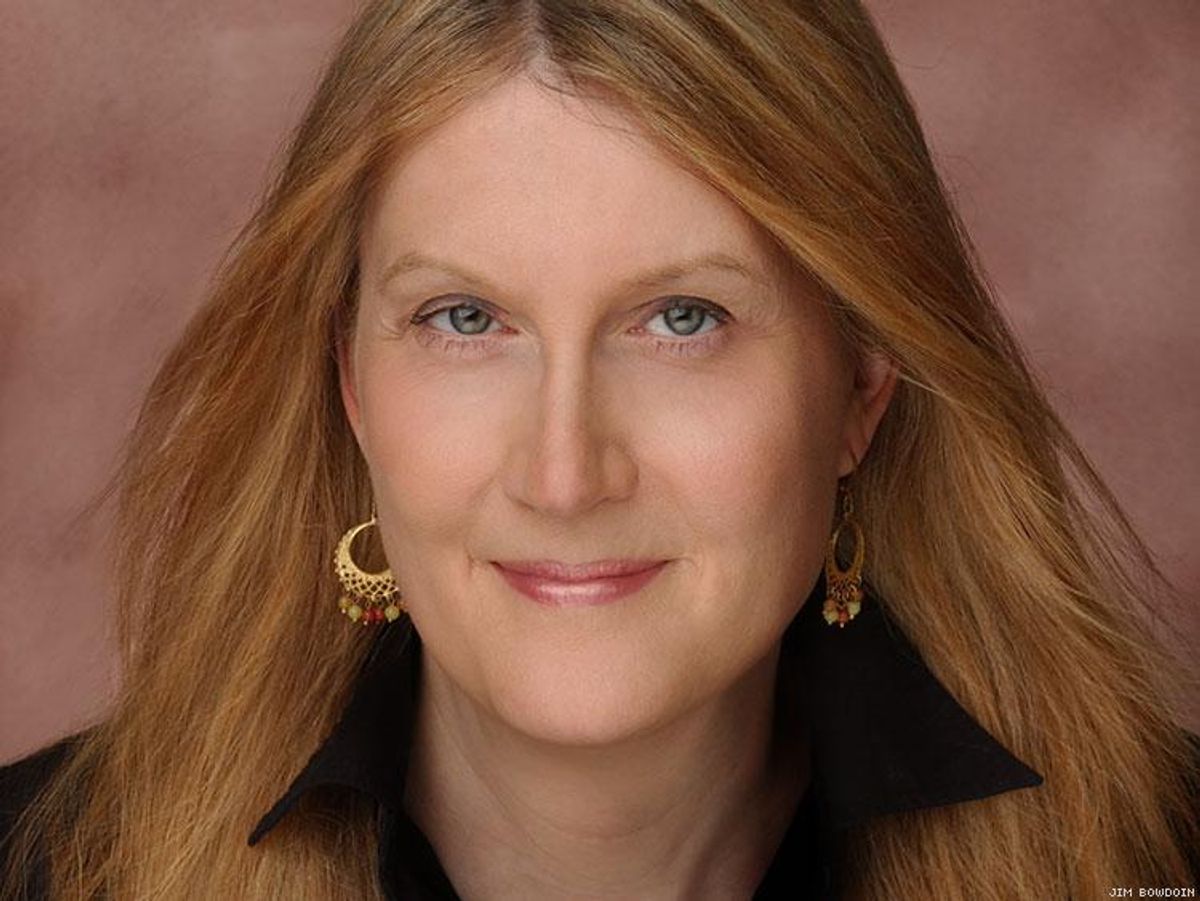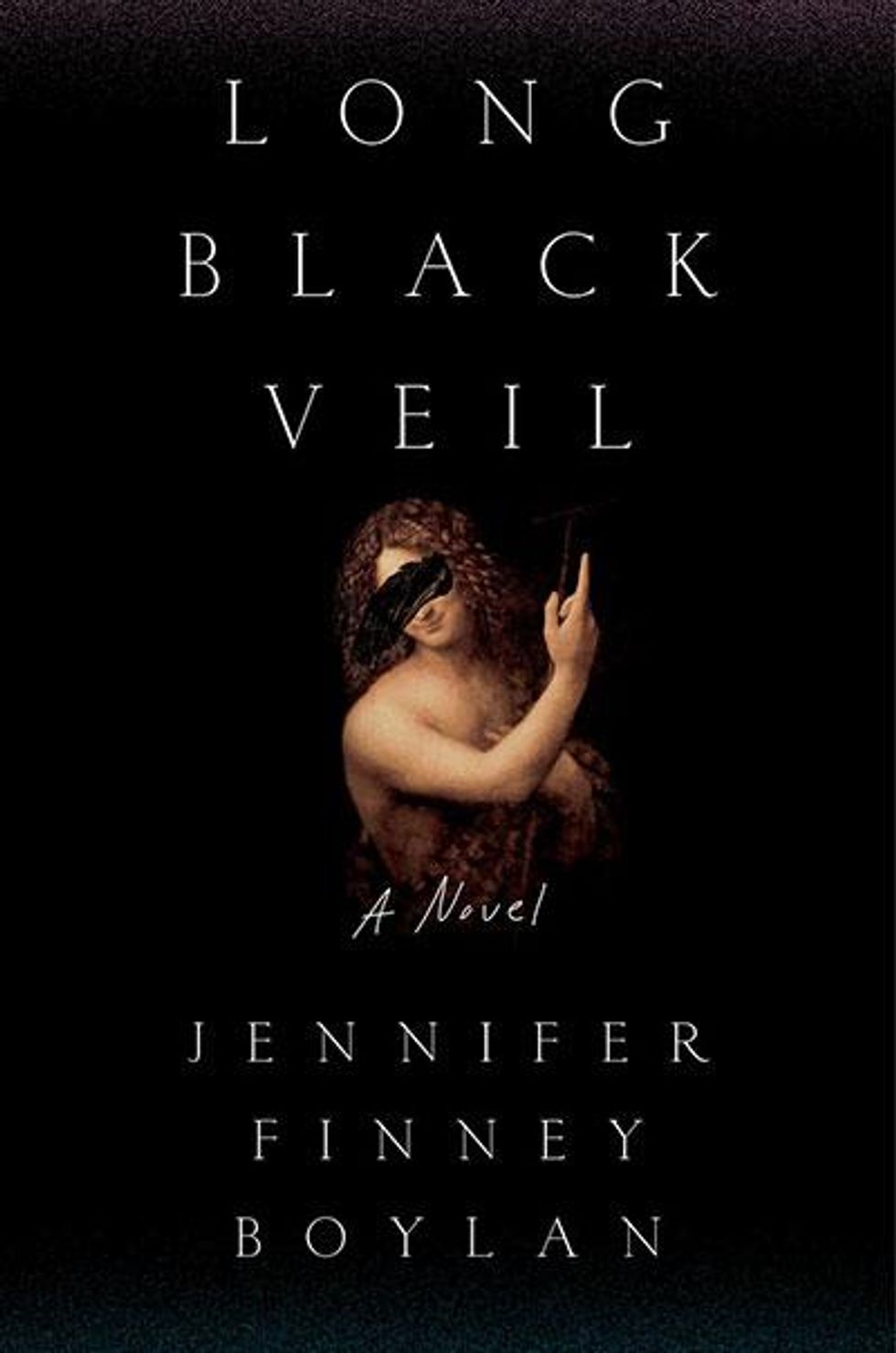A transgender woman in her late 20s stands at the edge of a cliff in Nova Scotia. She's at the end of her rope. She feels like she has no recourse.
It's at this moment that the story of Jennifer Finney Boylan and Judith -- a character in Boylan's new novel, Long Black Veil -- diverge. Staging "pseudocide," or a faked suicide, Judith rolls the car off the edge, and says goodbye to her old name and life.
Boylan, on the other hand, might have jumped that day. However, a gust of wind blew her back. That gust -- its own act of deus ex machina -- saved and changed her life.
"I had this profound moment where something pulled me back," Boylan said of that fateful day, which she previously recounted in her bestselling 2003 memoir, She's Not There: A Life in Two Genders. "I got back in the car and I drove back to America, and New York City, where I, within days, at a party, ran into a woman who I married and who I'm still married to 30 years later."
The love of Boylan's wife, Deirdre, "transformed my life" and "gave me the courage to come out and go through transition," said Boylan, who is now 58 years old. Long Black Veil, released today after five years in the making, is the first work of fiction Boylan has written since beginning her transition in 2000. It is a mystery, which is a departure from the trans author's known preference for memoir. But the story about a group of college friends -- and what happens to the group after one disappears after a trip to an abandoned asylum -- is very personal for Boylan.
"Memoir is great, because it has the power of truth. But you're also limited to the facts of your own life. I thought it would be interesting to imagine lives that were not exactly mine," said Boylan, who said many facets of her characters "parallel her own."
These characters will also resonate with LGBT readers, most of whom know what it's like to live with a secret.
"I've always been interested in mysteries," Boylan said. "I'll be honest, I've always been less concerned with the question of 'Whodunit?' than the question of, 'What is the effect of having a secret on a life?' And, 'What is it like to not quite be yourself?'"
"It's not the mystery you solve. In some ways, it's the mystery you live," said Boylan, who has seen this mystery change over the years.
"It's funny because at one point, if you were gay or trans or queer, keeping that part of yourself secret was kind of the default, right? The idea of people living their truth out loud was very, very rare when I was growing up," Boylan said. "My guess is [today] most people at least above a certain age probably are out and probably are out with pride and are able to go about their lives."
"That means that our culture has changed, and that means that the stories that we tell about our culture has changed as well," Boylan said.
[RELATED: An Excerpt From Jennifer Finney Boylan's New Thriller]
There are other differences between Judith and Jenny than a wrecked Volkswagen. Judith lives "stealth." After staging her death, she begins a new life, in which she hides her transgender identity from the man she marries and the son she adopts.
Boylan was never stealth, but she had her own fears about coming out to her family. Boylan married Deirdre in 1988, and came out in her late 30s.
"I was afraid that I would make everyone's life more difficult and harder," Boylan recalled. "I was afraid. I didn't know what the effect would be on my life and on the people around me. I didn't know if I'd lose my job. I didn't know what my wife would do. I didn't know what my children would think."
Her fears regarding her family's response proved to be unfounded. Her wife was a supportive ally, who helped Boylan plan a "well-managed transition." Likewise, Boylan realized her sons, who were young children at the time, would also be fine. She had this epiphany one night at the dinner table, when her older son, Zach, looked at her with a curious expression.
"What?" Boylan asked.
"We can't call you 'daddy' if you're going to be a girl. That's too weird," he replied.
"Well, you could call me Jenny, if you wanted, because that's my name now that I'm using," Boylan said.
"Isn't 'jenny' the name of a lady donkey?"
"Yeah..." Boylan said, to the laughter of the table. "Well, what do you all want to call me?"
Zach thought about it, and he said, "Well, why don't we call you Maddy? That's like half 'mommy' and half 'daddy.'"
The name stuck. And when "Maddy" was born, Boylan knew the kids would be all right. In fact, she was proud to see them flourish as they grew older. Zach is now 23, and Sean turned 21 today, on the date of the novel's publication.
"In some ways, I think having a father who became a woman has helped make my sons into better men, in that they know the value of living your truth," Boylan said. "They believe in standing up for the underdog. They believe in people who other people don't understand. I think it's made my sons stronger men."
However, at the time of her transition, Boylan was most afraid of losing her mother, whom she described as Republican, evangelical Christian, conservative, and a "nice lady from the suburbs." Boylan prepared herself for the worst when she came out to her.
"I've known this about myself since I was a child, but I was afraid to tell you, because I was afraid you wouldn't love me anymore," Boylan said at the time. She was surprised by her mother's response. She rose from her chair, put her arms around her, and said, "I would never turn my back on my child."
Then, quoting First Corinthians, her mother said, "The greatest of these is love," and "love will prevail."

"If I'd known that love was gonna prevail, I would have come out when I was 10 years old," Boylan said in present day. "It took me half my life to learn how good other people can be. Although, I should also say, many people who come out as trans learn the opposite. They learn how terrible people can be. They learn how violent and full of hate people can be. So as gifted and lucky as I am, I'm aware there's privilege baked into that too, and not to take anything for granted."
Boylan is a practicing Christian, who worships at The Riverside Church in Upper Manhattan. "I'm not really into Christiantiy for the smiting. I'm in it for the love," said Boylan, adding, "My faith is a powerful thing for me."
Faith is also featured in Long Black Veil. The book's cover depicts a painting of St. John the Baptist by Leonardo da Vinci -- the Renaissance artist's final work, which plays a role in the book as a potent symbol. Historically, da Vinci's painting of the physically androgynous nude figure sparked controversy and centuries of gay rumors, leading censors to add clothing and a cross. A modern parallel is drawn when Judith has her portrait painted in this style.
"That's the whole thing in a nutshell," Boylan said. "Transgender people are in some ways divine cratures. We do have our fingertips on something more eternal than other people, because we experience both sides of being human and everything inbetween. I just love that painting. It's just fascinating to me."
In addition to her career as a writer, Boylan is a professor of English at Barnard College. She also serves as cochair of the national board of directors of GLAAD, a prominent LGBT media organization. After seven years, 2017 is her last year in the position. But it is certainly not her last year of involvement -- Boylan hopes to play a role in a new initiative, the GLAAD Media Institute, which provides training to grassroots groups.
Regardless, Boylan is proud of the work she has accomplished at GLAAD, which she said she helped "transify." She saw the difference at the 2017 Media Awards, which had an the abundance transgender representation this year -- a win for Amazon's Transparent, and a guest list that included a host of trans public figures like Isis King, Geena Rocero, and Trace Lysette.
"My goal was to trans-ify the place and to transify the movement and also to restore a sense of order and functionality both to the board and to the organization as a whole. And I'll tell you what, I don't want to boast, but we're in a great place as an organization and we're really well poised to do the work that is to come ahead," she said.
Boylan has seen remarkable progress during her tenure at GLAAD, including marriage equality and greater legal protections for the LGBT community. She's also experience a marked rise in her own visibility. She had a role advising Caitlyn Jenner on E!'s I Am Cait, worked as a consultant on Transparent, and occasionally pens columns for The New York Times.
But Boylan acknowledged the privilege she, and many others in the LGBT community have gained, even as others in the same community have suffered. In 2015, as Transparent is being showered with awards by Hollywood, the reported murder rate of transgender women of color in the U.S. skyrocketed. In one moving op-ed, "Trans Deaths, White Privilege," Boylan listed her diary entries from the days each woman was killed.
"Around the time I was at Riverside, Taja Gabrielle DeJesus was found dead in a stairwell in San Francisco," wrote Boylan. Her piece concluded: "Did their lives matter any less than mine?"
The article served as a reminder to anyone with privilege that the tide of progress is inextricably linked to the undertow of violence.
"Even with Trump, we are in a better place culturally than we were seven years ago. But with all that visibility comes increased blowback, and that makes an increased risk of violence, particularly for trans women of color," Boylan said.
"That means that things are not better for everyone. And for some people, they are actually worse. And this is the way privilege and intersectionality of marginalized identities all come together, because it means that for all the progress that we've made, it also comes with a price."
Long Black Veil is just a novel. But Boylan hopes that readers, in addition to enjoying a good mystery, ask themselves questions that speak to privilege, identity, change, and how secrets can influence our lives.
"If we change over time, what about us remains the same, and what is that thing that remains the same? I would call it soul. But if we change dramatically over the course of our lives, how do we make sense of our lives? If we are not the people that we were, how do we find any sense of permanence or continuity in our lives?" Boylan asked.
"What do we owe the friends of our youth? Are the promises you make when you're 20, promises that are still enforceable when you're 60? How much change can a person go through and still be themselves? And so, the obvious question, which I already said is, what is the cost of bearing secrets? And what is the cost of unburdening yourself of those secrets?"
Long Black Veil is available in bookstores and Amazon today. Read an excerpt here.


















































































Viral post saying Republicans 'have two daddies now' has MAGA hot and bothered